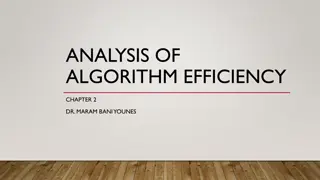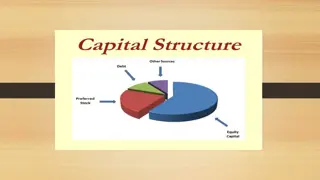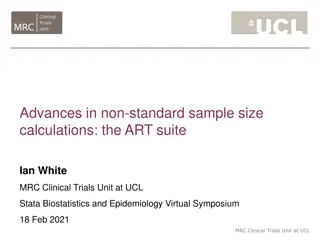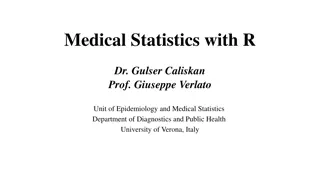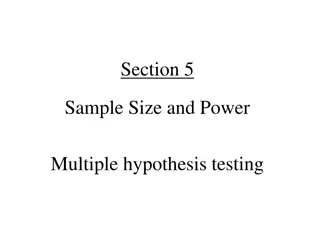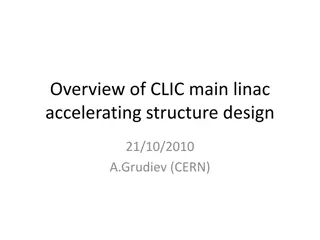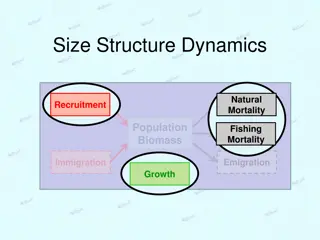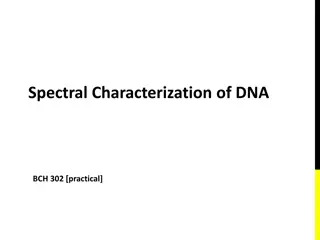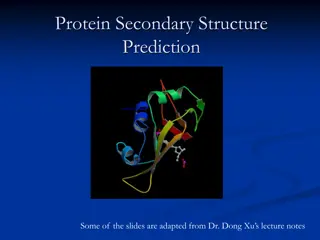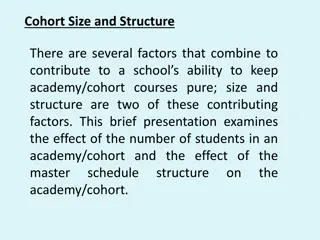Algorithm Analysis
Algorithm analysis involves evaluating the efficiency of algorithms through measures such as time and memory complexity. This analysis helps in comparing different algorithms, understanding how time scales with input size, and predicting performance as input size approaches infinity. Scaling analysi
1 views • 30 slides
Elemental analysis & Structure Elucidation
Understanding elemental analysis and structure elucidation is crucial in chemistry. Learn the process, calculations, and methods involved, such as mass spectrometry, infrared spectroscopy, and nuclear magnetic spectroscopy. Discover how to determine empirical and molecular formulas using examples li
1 views • 27 slides
Anime Life Size Sex Dolls Order Now01
With the Anime Life Size Sex Dolls from Sndoll.com, live out your wildest fantasies. Savour your deepest fantasies with our realistic and superior dolls. Place your order today!\n\n\/\/sndoll.com\/shop\/life-size-anime-sex-doll-porn\/
4 views • 1 slides
Determining Sample Size for Research Studies: Factors and Considerations
Sample size estimation in research is a crucial step that involves various factors such as effect size, population standard deviation, power of the experiment, and significance level. The effect size indicates the practical significance of research findings, with common measures like Cohen's d and P
1 views • 24 slides
Understanding the Structure and Symmetry of Viruses along with Cultivation Methods
Viruses, defined as obligate intracellular parasitic organisms, exhibit general properties such as small size, filterability, simple structure, and absence of cellular components. They vary widely in size and lack independent metabolism. The cultivation of viruses plays a crucial role in studying th
3 views • 37 slides
Understanding Size Separation in Pharmaceutical Processing
Size separation is a crucial unit operation in pharmaceutical manufacturing, involving the segregation of particles based on physical differences like size, shape, and density. This process, also known as sieving or screening, is essential for improving powder mixing, particle solubility, and stabil
1 views • 31 slides
Understanding Comminution and Particle Size Reduction in Pharmaceutical Processes
Comminution is the process of reducing particle size from larger to smaller particles, crucial in various industries like pharmaceuticals. This operation involves milling, grinding, and size reduction to make raw materials usable. The particle size plays a significant role in pharmaceutical formulat
2 views • 50 slides
Comprehensive Cost Management Training Objectives
This detailed training agenda outlines a comprehensive program focusing on cost management, including an overview of cost management importance, cost object definition, cost assignment, analysis, and reporting. It covers topics such as understanding cost models, cost allocations, various types of an
2 views • 41 slides
Understanding Bitmap Image Data Representation and File Size Calculation
This content delves into the fundamentals of bitmap images, covering topics such as resolution, color depth, file size calculation, and metadata. Explore how different parameters affect the quality and size of images, with practical examples and activities to enhance learning.
0 views • 18 slides
Understanding Energy Analysis in Size Reduction Equipments
This comprehensive overview delves into the energy analysis involved in size reduction equipment, exploring topics such as objectives of size reduction units, sieve analysis for particle size distribution, mesh number system, and mathematical models for energy analysis in size reduction units. Dr. J
0 views • 11 slides
Understanding Algorithm Efficiency Analysis
In this chapter, Dr. Maram Bani Younes delves into the analysis of algorithm efficiency, focusing on aspects such as order of growth, best case scenarios, and empirical analysis of time efficiency. The dimensions of generality, simplicity, time efficiency, and space efficiency are explored, with a d
1 views • 28 slides
Qualitative Data Analysis Techniques in Research
The purpose of data analysis is to organize, structure, and derive meaning from research data. Qualitative analysis involves insight, creativity, and hard work. Researchers play a crucial role as instruments for data analysis, exploring and reflecting on interview discussions. Steps include transcri
1 views • 27 slides
Understanding Size and Spacing of Rural Settlements in Geography Research
This presentation delves into the significant influence of size and spacing on the distribution pattern of rural settlements. It explores how factors like population size, areal size, topography, soil fertility, and more impact the density and distribution of settlements, categorizing them based on
1 views • 15 slides
Features of an Appropriate Capital Structure and Optimum Capital Structure
While developing a suitable capital structure, the financial manager aims to maximize the long-term market price of equity shares. An appropriate capital structure should focus on maximizing returns to shareholders, minimizing financial insolvency risk, maintaining flexibility, ensuring the company
2 views • 5 slides
Advances in Sample Size Calculations for Clinical Trials: The ART Suite
This presentation discusses the importance of sample size calculations in research studies, especially in the context of clinical trials. It covers tools like ART and Power in Stata for binary and categorical outcomes, emphasizing the need to determine the right sample size to ensure research questi
3 views • 35 slides
Understanding Sample Size and Effect Size in Medical Statistics
Explore the crucial aspects of power analysis, sample size determination, effect size estimation, and their interrelations in medical statistics. Learn how these components influence experimental design and decision-making in research studies. Discover the significance of adequately balancing sample
0 views • 46 slides
Guidelines for Checking Poster Size & Layout
In this guide, you will learn how to check the size of your poster by customizing the slide dimensions to ensure it fits your easel properly. The steps involve navigating to the Design Tab, selecting Custom Size, and determining whether your layout should be portrait or landscape. Follow these instr
1 views • 7 slides
Unicellular vs. Multicellular Organisms: A Comparative Analysis
Unicellular and multicellular organisms differ in structure, division of labor, specialization, exposure to environment, response to injury, size limitations, lifespan, and ability to divide. Unicellular organisms have a single-cell body, limited operational efficiency, and face challenges in size a
0 views • 12 slides
Importance of Size Reduction in Pharmacy: Advantages and Disadvantages
Size reduction plays a crucial role in pharmacy by enhancing solubility, extraction rate, mixing quality, and more. However, there are also potential drawbacks such as changes in drug stability and flowability issues that need to be considered. Understanding the benefits and limitations of size redu
1 views • 58 slides
Incident Command Structure and Span of Control Overview
Incident Command Structure helps in managing incidents effectively by utilizing ICS terminology and levels as needed. The flexibility within ICS allows for structuring incidents correctly based on individual needs. Understanding the Span of Control is crucial for supervisors to manage the number of
2 views • 24 slides
Understanding Sample Size, Power, and Hypothesis Testing in Statistics
Sample size determination based on estimation precision and confidence interval width is crucial in statistical analysis. By calculating the necessary sample size, researchers can ensure sufficient standard errors and confidence intervals. Additionally, the relationship between power and sample size
0 views • 50 slides
Ancillary Structure Analysis for Long-Baseline Neutrino Facility Horn Prototype
The ancillary structure analysis for the Horn A prototype at the Long-Baseline Neutrino Facility involves detailed documentation tracking, FEA projects, and design considerations such as conductor stiffness and spider loading. The analysis approach includes rigorous documentation and peer review pro
0 views • 25 slides
Understanding Skyline Computation Algorithms and Expected Size Analysis
Explore topics related to skyline computation algorithms, skyline point generation, and expected skyline size analysis. Learn about Pareto optimality, dependent points generation, and the expected size of skylining points in a random setting. Delve into the algorithms, probabilities, and complexitie
0 views • 25 slides
Nevada Class-Size Reduction Program Overview
The Nevada State Board of Education implemented the Class-Size Reduction Act to reduce pupil-to-teacher ratios in early grades. Research shows mixed results on the effects of class-size reduction, with studies from various states highlighting different outcomes. The history of class-size reduction r
0 views • 14 slides
Overview of CLIC Main Linac Accelerating Structure Design
Detailed discussion on the RF design constraints, beam dynamics, and structure optimization for the CLIC main linac accelerating structure. The analysis covers parameters such as bunch population, wake suppression, RF breakdown, and surface heating constraints. Additionally, the first generation of
1 views • 26 slides
Introduction to IBM SPSS Modeler: Association Analysis and Market Basket Analysis
Understanding Association Analysis in IBM SPSS Modeler 14.2, also known as Affinity Analysis or Market Basket Analysis. Learn about identifying patterns in data without specific targets, exploring data mining in an unsupervised manner. Discover the uses of Association Rules, including insights into
0 views • 18 slides
Understanding Atomic Structure and Laws of Matter
Explore the fundamental concepts of atomic structure, including the size of atoms, evidence of atomic composition, and key laws of matter such as the Law of Conservation of Mass. Delve into the historical understanding of atomic structure and the contributions of significant scientists like John Dal
0 views • 29 slides
Enhancing OPTN/UNOS Committee Structure for Improved Collaboration
The current one-size-fits-all committee structure at OPTN/UNOS poses challenges in effectively representing diverse perspectives and expertise. By reevaluating the committee roster and structure, there is an opportunity to enhance collaboration, ensure broader representation, and increase stakeholde
0 views • 17 slides
Understanding Fish Population Dynamics through Size Structure Analysis
The concept of size structure analysis provides valuable insights into various aspects of fish population dynamics, including recruitment, growth, fishing mortality, and natural mortality. By examining length frequencies and proportional size distributions, researchers can better understand the comp
2 views • 10 slides
Understanding DNA Structure and Denaturation Process
DNA is a double helical structure made of 2 antiparallel polynucleotide chains with nucleotide monomers. The structure contains deoxyribose sugar, phosphate groups, and nitrogenous bases (purines and pyrimidines). Hydrogen bonds between base pairs stabilize the structure. Denaturation can occur due
0 views • 16 slides
Protein Secondary Structure Prediction: Insights and Methods
Accurate prediction of protein secondary structure is crucial for understanding tertiary structure, predicting protein function, and classification. This prediction involves identifying key elements like alpha helices, beta sheets, turns, and loops. Various methods such as manual assignment by cryst
0 views • 30 slides
Understanding the Hierarchy of Protein Structure
To understand proteins' final shape and function, one must grasp the primary, secondary, tertiary, and quaternary structure levels. Proteins, composed of amino acids, fold into various shapes crucial for their roles such as signaling, catalysis, and structure. The primary structure represents the am
0 views • 28 slides
Introduction to Static Analysis in C.K. Chen's Presentation
Explore the fundamentals of static analysis in C.K. Chen's presentation, covering topics such as common tools in Linux, disassembly, reverse assembly, and tips for static analysis. Discover how static analysis can be used to analyze malware without execution and learn about the information that can
0 views • 54 slides
Cookie Size Comparison Based on Average Radius
Comparing two pairs of cookies with average radii of 8 cm and 7 cm respectively. Through a series of adjustments to maintain an average radius of 7 cm, the total area, individual areas, and target average area per cookie are calculated for various cookie size combinations. The analysis aims to find
0 views • 18 slides
Industrial, Microbiological & Biochemical Analysis - Course Overview by Dr. Anant B. Kanagare
Dr. Anant B. Kanagare, an Assistant Professor at Deogiri College, Aurangabad, presents a comprehensive course on Industrial, Microbiological, and Biochemical Analysis (Course Code ACH502). The course covers topics such as Industrial Analysis, Microbiological Analysis, and Biochemical Analysis. Dr. K
0 views • 16 slides
Understanding Financial Statement Analysis: Framework, Examples, and Types
Dive into the world of financial statement analysis with a focus on its framework, external and internal uses, and primary types of financial statements. Explore how businesses assess their financial health through ratio analysis, trend analysis, and common-size analysis to make informed decisions f
0 views • 68 slides
Benefits of Probabilistic Static Analysis for Improving Program Analysis
Probabilistic static analysis offers a novel approach to enhancing the accuracy and usefulness of program analysis results. By introducing probabilistic treatment in static analysis, uncertainties and imprecisions can be addressed, leading to more interpretable and actionable outcomes. This methodol
0 views • 11 slides
Evolution of Survival Sample Size Methods and Considerations in Survival Analysis
Survival analysis sample size determination is crucial for estimating the expected duration of time to an event accurately. Over time, methods have evolved from simple approximations to more complex models, offering greater flexibility and accuracy in study design. Considerations such as expected su
0 views • 9 slides
Impact of Cohort Size and Structure on Academic Pathways
This presentation explores how cohort size and structure influence academic pathways in schools. It delves into the effects of student numbers and master schedule structures on cohort courses, using examples and visuals to illustrate the concepts. From analyzing a Linked Learning Pathway with 120 st
0 views • 9 slides
Particle Size Analysis in Industrial Pharmacy: Methods and Importance
Particle size analysis is crucial in pharmacy for determining the size range and properties of particles. This lecture covers different methods of particle size analysis, such as microscopy, sieve analysis, sedimentation, and electronic determination, along with the importance of particle size in ph
0 views • 47 slides










